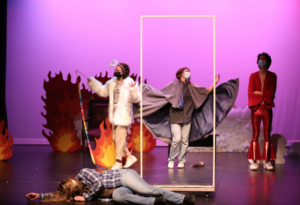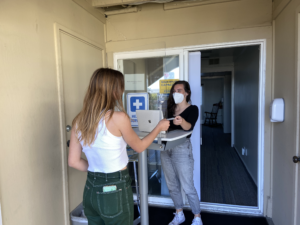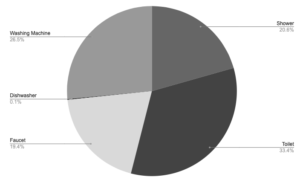The Lick-Wilmerding community eagerly anticipated the 34th Annual One-Acts Festival. The fully student-led event featured a range of performances from far-out there comedies to serious dramas. The two performances were on February 11th and 12th at 7:30 p.m. and included a Q&A after the shows with the writers and directors about their creative process.
This year, due to the Omicron surge, the One-Acts festival was only available live to LWHS: students, faculty and staff, as well as immediate family members. The performances were live-streamed and also available through a link soon afterward for anyone who was unable to attend. All actors and attendees were required to wear a surgical or KN-95 mask per the school guidelines. Audience members also sat in every other seat.
In lieu of ticket sales, LWHS collected donations for the Hamilton Family Charity.

photo courtesy of Lick-Wilmerding
The One-Acts are an accessible and fun opportunity for all students both creatively and practically. Opportunities to participate in the One-Acts include not only directing and acting, but writing the scripts, designing the sets, designing and managing costumes, stage managing and running the tech (sound and lighting). Some students work on many aspects of the productions. Miguel Zavala, Theater Teacher and Director of After School Theatre Program, said, “One of the gems for me is just seeing kids that don’t usually participate in theater come out for the One-Acts, whether it’s writing or acting.”
There are five plays directed by seniors and four interludes directed by juniors. Interludes are short pieces that help cover the set changes between the plays and happen in front of the curtain or elsewhere in the audience. Interludes are no more than five minutes. The longer plays range from 10-20 minutes.
Who writes the One- Acts? In early November, interested LWHS students had the opportunity to submit scripts. Each year, there are a dozen or more submissions. The content of the plays is up to the student writers, however, all submissions are vetted by Zavala and the school counselors. The writer either writes an interlude or a play. According to Zavala, interludes can turn into plays or vice versa throughout the process.
Directors choose their One-Act after anonymously reading all the student-written submissions and then begin working through final edits with the writer. The script a writer submits is not necessarily the final script there is still room for much collaboration between the director and writer in adapting it for the final performance.
Directing is a semester-long course available to juniors and seniors, taught by Zavala. During junior year, students can direct interludes or co-direct a One-Act with a peer. Typically, seniors independently direct One-Acts unless there are more directors than performances.
After taking the directing course, students learn many valuable skills that prepare them to be self-reliant when directing the One-Acts. Zavala said, “Once they take the course they learn all the elements of directing — the principles and elements of directing which include how to stage a scene, come up with a vision, come up with a concept, how to interpret a script, how to think about their audience, current events, the community and culture.”
Some directors are drawn to the same scripts which can sometimes require “peaceful negotiations,” according to Lucie Bacho ’22. When directors pick which script they want to work with, Lillian Devlin ’22 said, “People just kind of see how it would sit with the Lick audience and consider the Lick sense of humor from the spotlight videos.”
Devlin said, “There is always one that people are more drawn to because it’s more comedically out there. They know it will jazz everyone up and the directors see that potential.”
Jax Blaska ’15 is supporting the 2022 One-Acts as a playwriting and director coach. Blaska graduated from Yale University in 2020 with a bachelor’s in theater and performance studies and gender and sexuality studies. Blaska has worked professionally in theater predominantly as a director. They worked in collaboratively devised theater during the summer after their freshman year.
During their time at LWHS Blaska acted in three One-Acts as well as wrote and directed. When reflecting on their high school experience with the One-Acts Blaska said, “I think it did so much for my creative development and confidence-building as a theater artist.”
Blaska came back to LWHS as a teaching assistant and worked with Zavala on the Spring Podcast project in lieu of a play over the virtual year. Blaska said, “It was really nice being back in the Lick community — it’s an amazing group of people who are really talented and passionate about what they do.”
Blaska and Zavala occasionally stop by the rehearsals to assure everything is going smoothly, they encourage students to get the staging done and the actors to memorize their lines.
Students choose the show order and design the layout for which plays and interludes go where. Zavala encourages students to create an emotional arc and consider the desired impact and impressions that will be left with the audience.
Additionally, the flexible, student-designed scheduling works well for people with possibly limited availability after school. Bacho said, “For actors, there is definitely a low time commitment for the most part. Directors often don’t call all the actors for each rehearsal.”
Directors work outside of rehearsal collaborating with their design teams and working out blocking which they later bring to their actors in rehearsal.
Preparations for the One-Acts and this year’s musical, Cats, are happening simultaneously. Zavala said, “Students that are doing both navigate that for about a month, and then once the One-Acts are over they can fully commit to Cats.” Due to this overlap, directors have scheduled One Acts rehearsals to take place during tutorial or lunch, and in most cases are not happening every day.
Bacho directed “A Dream Reality Musical Sojourn: Forbidden Love is a Slow and Patient March,” a comedy written and by Evan Aubry ’22. Uniquely, in addition to writing this One-Act, Aubry composed this musically integrated play. Aubry also worked as a voice coach for the actors. Because of the musical element and the larger cast size of this One-Act, the play needed additional rehearsal time. Rhea Verghese ’23, an actor in “A Dream- Reality Musical Sojourn,” said, “Learning the sheet music and conveying the character correctly has been challenging, but the musical element of the play is super exciting.

photo by Adrianna Delgadillo
Devlin directed “Italian Restaurant” written by Andrzej Davis Krukowski ’23 which follows the lives of Sam, a transgender woman played by Rowan George ’23 and her wife, Donna, played by Charlotte Baszucki ’22. She was inspired to take directing class after seeing the One-Acts in previous years. Moreover, her love of acting made her curious to explore directing. Devlin chose her One-Act out of many because of the challenge of directing a play with a more serious tone. The play is set in the 90s and addresses transphobia. Bacho said that the serious, dramatic plays “are more about the writing and acting instead of just being slapstick crazy humor. The One-Acts have a good balance of both.”
As actors, Bacho and Devlin have the added perspective of what makes for a good director. They concur that directing takes a lot of organization and were grateful for the practice of employing newly learned skills through directing a mock scene in class.
The different teams collaborate through occasional production meetings where directors get to meet with their design team and stagecraft. Zavala said, “There is lots of communication between the kids, they’re really running the show which is awesome.”
“Dying Wish,” a comedy written by Jacob Weiner ’23 and co-directed by Alexa DiSabato ’23 and Benny Wertheimer ’23, tells the story of Reggie, played by Colin O’Brien ’23, and Joe, played by Eliana Fassil ’24 who go on an eventful hike. DiSabato was interested in the Directing class because of the positive experiences she had heard from students who wrote, directed, and acted. In middle school, DiSabato was involved in stage managing plays and musicals and was interested in taking Directing to see another perspective. DiSabato said, “It was a really fun experience. I learned that directing is a lot more than just blocking, it’s about learning how to have confidence in yourself and be a leader. I definitely think that other people should take the class because it teaches really important life skills outside of just the theater world.”
The One-Acts push students to find comfortability and balance with being a leader, especially when directing other students. Blaska said it can be tricky “Being able to articulate to your peer the vision you have and what you want to see on stage without feeling awkward or like there’s a power imbalance.”
Zavala said, “I think the best part for me is seeing them take on these leadership skills that are going to help them in later life, problem-solving, critical thinking, public speaking and self-confidence.”
Friday, February 11 was a high-spirited day for LWHS students with both the Kick-Wilmerding soccer games and the One Acts. Both events were well attended and students could take LWHS arranged busses back to campus from Kezar Stadium, just in time to see the One-Acts.







